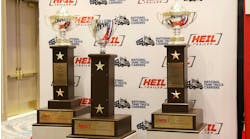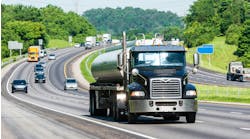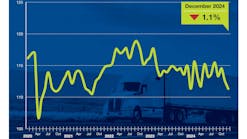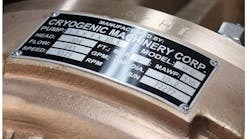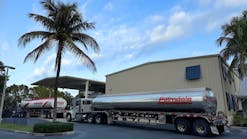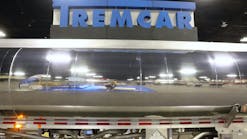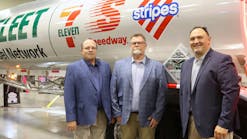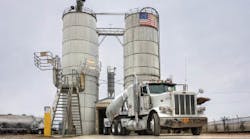Arkansas cement hauler thriving with strong customer service focus
Hugh McConnell III spends little time looking back at the past year and the economic challenges that came with it. His focus is on 2010 and well beyond.
He is the third-generation owner of McConnell & Son Inc, a dry bulk hauler based in North Little Rock, Arkansas. Running 24 tractors and 30 trailers, the carrier specializes in hauling cement, fly ash, sand, and other construction materials.
“We see a goodyear ahead,” McConnell says. “More infrastructure construction jobs funded with federal stimulus money are coming on line. For instance, two big highway interchanges are under construction in the Little Rock area right now. Other road work is underway throughout the region that we serve. We expect to see more shipments of roofing materials and other construction materials.
“The past year had its ups and downs, but we fared well overall. We actually grew in 2009. The fourth quarter of 2008 and the first quarter of 2009 were tough, but business picked up in the second quarter and we finished the year strong. Among other things, we benefited from demand for roofing materials needed to repair homes damaged by spring storms.”
Coal hauler
Construction material hauling has been an important part of the operation for a majority of the time McConnell & Son was in business. However, the company was started by McConnell's grandfather, Hugh, in 1931 as a Pennsylvania coal hauler running a fleet of dump trucks.
In 1948, customer S E Evan's Coal Company convinced the McConnell family to move the entire dump truck operation to a coal mine in Bokoshe, Oklahoma. The trucking company expanded into road construction as work on the interstate highway system commenced in the mid-1950s. In 1959, McConnell's father, Hugh McConnell II and wife, Susie, relocated the company to North Little Rock to pick up more of the highway construction business.
By the mid-1960s, McConnell & Son was hauling fertilizer, lime, crushed stone, and sand in dump and dry bulk trailers. Trucking industry deregulation in 1980 brought the opportunity for the carrier to haul cement, which had been a regulated commodity.
Today, McConnell & Son is in the hands of the third generation and is focused solely on hauling bulk construction materials for a very loyal customer base. “A big reason for our continued success in this recession is the good customer base that we built over the years,” McConnell says. “We have a long history with many of our customers.”
Five states
The carrier serves customers across a five-state region that includes Arkansas, Oklahoma, Texas, Louisiana, and Tennessee. The company's only terminal is in North Little Rock, but tractor-trailer rigs are based throughout the region.
“Numerous building materials companies are in the five-state region,” McConnell says. “Most of the loads we haul go to ready mix plants or roofing material manufacturers.”
Shipments are handled by a team that includes 21 company drivers and five owner-operators. Two of the owner-operators have both tractor and dry bulk trailer.
“It's not usual for an owner-operator to have his own trailer in this business,” McConnell says. “This was an unusual circumstance, though. They worked for an out-of-state contractor that required owner-operators to provide both the tractor and trailer. The contractor's business deteriorated during the recession, and the drivers came to us looking for work.”
Lean operation
The owner-operators joined a dedicated organization that goes out of its way to deliver outstanding customer service. “We surround ourselves with people who work hard and care about our company and our customers,” McConnell says. “We select drivers with at least two years over-the-road truck driving experience, and we have very low turnover.”
It's also a very lean operation. “Our objective is to continually look for ways to run more efficiently while still meeting customer expectations,” McConnell says. “We want to do better with what we have. We believe it isn't the number of trucks in the fleet that is important; it is how we work those trucks that determines our success and ability to grow.”
Operating efficiency includes replacing equipment on an appropriate schedule. Tractors are replaced on a four-to-five-year cycle. Dry bulk trailers are run over the road for about 10 years before being shifted into storage applications.
Custom specifications
Company tractors are from Peterbilt, and the eight newest units are Model 388s that were purchased in December 2009. Fitted with 36-inch sleepers, the tractors have a wet tare weight of 27,160 pounds.
The powertrain includes a Caterpillar C13 engine rated at 430 horsepower and a 10-speed Eaton Fuller transmission. Tractors are specified with a Holland fixed-position fifthwheel and a single 130-gallon fuel tank. Running gear includes tandem-drive axles with an air suspension, Conmet aluminum hubs, and Alcoa aluminum wheels.
Product handling equipment consists of a PTO-powered Tuthill blower. “We have standardized on the Tuthill blower on new tractors because it is a very durable product with a variety of mounting configurations,” McConnell says. “We also have a very good relationship with the distributor, Kerley & Sears Inc. Blowers are powered off Chelsea and Muncie PTOs.”
McConnell & Son has been a long-time buyer of Heil dry bulk trailers with a 1,040-cu-ft capacity. “In our opinion, Heil builds the best trailer on the market for hauling cement and other products,” McConnell says.
Tank hardware includes Sure Seal and Ultraflo butterfly valves, Bayco check valves, Pelican tees, and Heil domelids. Solimar vibrators reduce unloading time. Gates hot air hoses are standard on the trailers, and the fleet uses Thermoid product hoses with fittings from PT Coupling.
For running gear, McConnell & Son specifies Hendrickson Intraax air suspensions and axles with Haldex antilock braking and roll stability. Trailers also have aluminum wheels and hubs and Goodyear DuraSeal tires.
James Mason, McConnell & Son maintenance director, considers the DuraSeal tire to be one of the most important components on the carrier's dry bulk trailers. That assessment stems from a rash of flats the fleet experienced during the summer of 2008 — 53 in July and 56 in August, with 90% of them occurring in the trailer position.
“Those were horrible months,” Mason says. “Normally we see 10 to 15 flats per month, so we were really pushing the limits when it came to downtime. And you can imagine how all those extra service calls and replacement tires blew out our tire budget. Things got expensive.”
Mason decided to try the self-sealing DuraSeal technology, which had just become available on Goodyear's G316 LHT trailer tire. “We had heard about what DuraSeal had done for mixed-service fleets, and we were happy to see that Goodyear had made the technology available in trailer tires,” he says. “We worked with our local Wingfoot dealer to see if the tires would work for us.”
DuraSeal technology is a gel-like, solvent-free compound built into the inner liner of the tire. It can instantly and consistently seal punctures up to a quarter-inch in the tread area, without the need to repair the tire until it is retreaded. However, it does not seal sidewall punctures.
The test trailer was one hauled by the driver who had suffered the most flats during the two months in 2008. “It was incredible,” Mason says. “The tires on that rig didn't have a single flat in the six-month test period. Our driver couldn't believe it, and I couldn't either. Since then, we've continued a shift to the DuraSeal tires as we phase out other brands of tires and casings.”
In addition to preventing flats, the DuraSeal tires also are delivering greater tread life. “The tires are performing well with little or no irregular wear,” Mason says. “At 120,000 miles, the original set of the tires still had 8/32nds left in tread life. That's almost 30,000 miles per 32nd.
Clean and reliable
Keeping the fleet looking good and in top operating condition are key management objectives. The carrier has a single wash bay for exterior cleaning and a small maintenance shop at the North Little Rock terminal.
Tractors are washed several times a month, and dry bulk trailers are cleaned up at least once a month. Wash bay workers use Back-Set and Aluminate cleaners from RoMix Chemical & Brush Inc on the trailers. Back-Set is a non-hazardous biodegradable product that dissolves set-up cement and turns it into a rinsable mud. Aluminate is an aluminum cleaner and brightener.
“Both of these product work very well,” McConnell says. “In fact, we believe that they are the best products on the market for cleaning cement trailers.”
The repair shop the terminal handles light maintenance. Primary activities include brake adjustments, tire inspections, seal replacement, and product blower installation. Major tractor and trailer repairs are outsourced to truck dealerships and commercial shops.
“While we can't justify a large shop, we believe it is important to have an in-house service capability,” Mason says. “Most of our fleet comes through the terminal every day, which means we have an opportunity to keep a close watch over every piece of equipment. That is an important part of managing the fleet.
“Our tractor-trailer rigs work in a tough environment. Some of our loads go to what seems like the middle of nowhere, and the vehicles operate over a lot of two-lane and gravel roads. It is critical that we avoid breakdowns no matter how difficult the conditions. In many cases, we have to meet a one-hour delivery window, and no time is allocated for breakdowns.”
Drivers perform a thorough pre-trip inspection before the start of every shift and any maintenance issues are immediately reported to Mason. Tires receive particularly close attention throughout the preventive maintenance process.
Tires are kept at 105 psi and steer and drive tires are regularly rotated. Axle alignments are scheduled as needed. “We have our own fleet fueling locations, and tire pressure is checked when the trucks are refueled,” Mason says.
Paying attention to the details helps ensure that McConnell & Son can meet customer expectations. That focus on service is carrying the company through this recession and has left it well positioned to thrive in coming years. ♦
